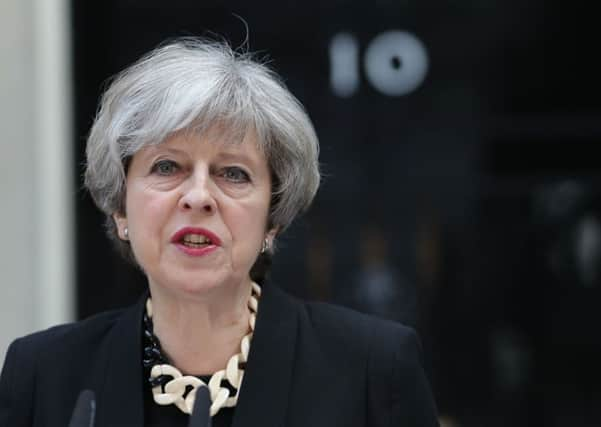Andrew Vine: Election in shadow of terror must be watershed moment


First Manchester, and now London, mean there cannot be any triumphalism. Too many people have been murdered and too many families left bereft for that.
The result, always overwhelmingly likely despite a stumbling Conservative campaign and a resurgence in Labour’s fortunes, is surely now certain.
Advertisement
Hide AdAdvertisement
Hide AdFighting terrorism, and rooting out the extremism that spawns it, has become the first priority for the new Government.
That makes it unquestionable that voters will put their faith in a Prime Minister with long experience of security matters as Home Secretary, rather than the untested Jeremy Corbyn.
The sight of Mrs May outside 10 Downing Street, dressed in the black of mourning as she twice had to articulate the nation’s horror and revulsion, underlined how this election has been transformed from essentially a debate over economics to one about security.
Suddenly, Brexit no longer feels like the major issue facing us. Even the state of the economy, the future of the NHS, or how we pay for the care of the elderly in the years ahead have all become secondary matters.
Advertisement
Hide AdAdvertisement
Hide AdThe attacks on children and their parents at a pop concert, and then on people enjoying a warm summer evening out at bars and restaurants have not only changed the nature of the election, but the way Britain needs to approach tackling terror.
Two atrocities within a fortnight, only weeks after the attack in Westminster, make this a watershed moment.
Until Saturday’s attack in London, it was just possible to hope that attempts to cause mass casualties remained rare, and that the security services were disrupting terror cells. There had been 12 years between the 2005 bombings of the London transport network and the suicide attack at Manchester Arena.
The victims strewn across the pavements of London Bridge and Borough Market before those of Manchester had even been laid to rest, on the eve of an audience of millions remembering them at Sunday’s fundraising concert, were the cruellest demonstration of how forlorn such a hope was.
Advertisement
Hide AdAdvertisement
Hide AdThis was always going to be an election that launched Britain into the unknown. We thought that unknown was Brexit and our future relationship with the world.
Instead, the greater and more dangerous unknown is how deeply embedded in sectors of British society Islamist extremism is.
If Mrs May had understandably thought that taking the country out of the EU was her most difficult challenge, the past two weeks have demonstrated that combating terrorism is infinitely harder.
It is right that the rival parties should spend the remaining two days until the election airing their policies on tackling terrorism. By doing so, they send a powerful message that our democracy can never be hurt by attacks. But once the result is in, political squabbling must play no part in what happens next.
Advertisement
Hide AdAdvertisement
Hide AdFighting an enemy within that is indiscriminate in its hatred and impervious to all appeals to reason demands consensus and cross-party support for Government action.
The Prime Minister’s declaration on Sunday that “enough is enough”, and that there had been for too long a tolerance of extremism, was inarguable. So was her assertion that the fear of causing offence cannot stand in the way of action.
There can no longer be any hiding places for extremists within communities which turn a blind eye, nor special pleading from any sector of society that seeks to absolve itself of responsibility of what is being done in its name.
There can be no question that an overwhelming majority of Muslim communities find the attacks utterly abhorrent. Islamist extremists pervert the faith they purport to serve by committing mass murder in its name.
Advertisement
Hide AdAdvertisement
Hide AdThis is a horrible dilemma for Muslim communities to which the only answer is an open-hearted commitment to rid themselves of any taint of association with extremists by co-operating fully and freely with the authorities, and a determination to root out those who seek shelter amongst law-abiding citizens.
It means embracing the Prevent anti-radicalisation programme, alerting the authorities to suspicious behaviour or the expression of extreme views, and being alert to the manipulation of impressionable young people.
This will not be an easy process. Uncomfortable conversations lie ahead in which entrenched positions will have to be challenged. There will be complaints of victimisation, but uppermost in all minds should be that the real victims are those of Manchester and London.
The entrenched positions of the giants of cyberspace must be challenged too. It is no longer tolerable for them to claim they cannot be held responsible for extremist material that appears on their platforms.
Advertisement
Hide AdAdvertisement
Hide AdThe outcome of every general election is always told in numbers – majorities, percentages, swings, turnout. So will this one. But the only numbers that really matter are those of the dead and injured.